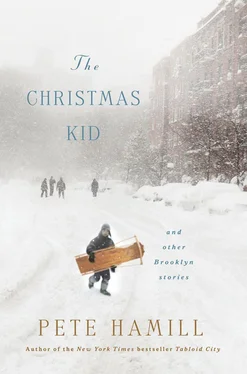The woman came around from the side aisle, easing toward the front of the line in a distracted way. Carmody saw her whisper to someone on the line, a young man who made room for her with the deference reserved for the old. She was hatless, her white hair cut in girlish bangs across her furrowed brow. She was wearing a short down coat, black skirt, black stockings, mannish shoes. The coat was open, showing a dark, rose-colored sweater. Her eyes were pale.
Holy God.
She was six feet away from him, behind two young men and a collector. A worn leather bag hung from her shoulder. A bag so old that Carmody remembered buying it in a shop in the Village, next door to the Eighth Street Bookshop.
He glanced past the others and saw that she was not looking at him. She stared at bookshelves, or the ceiling, or the floor. Her face had an indoor whiteness. The color of ghosts. He signed a book, then another. And the girl he once loved began to come to him, the sweet, pretty girl who asked nothing of him except that he love her back. And he felt then a great rush of sorrow. For her. For himself. For their lost child. He felt as if tears would soon leak from every pore in his body. The books in front of him were now as meaningless as bricks.
Then she was there. And Carmody rose slowly and leaned forward to embrace her across the table.
“Oh, Molly,” he whispered. “Oh, Molly, I’m so, so sorry.”
She smiled then, and the lines, like brackets, that framed her mouth seemed to vanish and Carmody imagined taking her away with him, repairing her in the sun of California, making it up, writing a new ending. Rewriting his own life. He started to come around the table.
“Molly,” he said. “Molly, my love.”
Then she took the nickel-plated revolver from the leather bag, the sweet smile frozen on her face.
Carmody thought: Oh, God. Oh, yes, God. Oh, yes. Do it.
She shot him four times in the chest, while women screamed and men shouted and many simply ran. She dropped the revolver on the floor beside Carmody and began to weep. One of the collectors said later that as the bullets tore into Carmody, he smiled and looked relieved.
Acknowledgment is made to the following publications, in which the stories in this collection first appeared, some with different titles or in slightly different form. New York Daily News: “The Christmas Kid,” “The Price of Love,” “A Death in the Family,” “A Christmas Wish,” “The Love of His Life,” “Good-bye,” “Changing of the Guard,” “Footsteps,” “A Poet Long Ago,” “The Car,” “Just the Facts, Ma’am,” “6/6/44,” “The Trial of Red Dano,” “Leaving Paradise,” “Lullaby of Birdland,” “The Boarder,” “The Radio Doctor,” “The Challenge,” “A Hero of the War,” “The Final Score,” “Gone,” “You Say Tomato, and…” “’S Wonderful,” “The Warrior’s Son,” “The Second Summer,” “The Sunset Pool,” “The Lasting Gift of Art,” “The Man with the Blue Guitar,” “The Hitter Bag,” “Trouble,” “Home Country,” “The Waiting Game,” “The Home Run.” Brooklyn Noir, edited by Tim McLoughlin: “The Book Signing.” Ellery Queen’s Mystery Magazine: “The Men in Black Raincoats” (reprinted in Brooklyn Noir 2, edited by Tim McLoughlin).
PETE HAMILL is a novelist, journalist, editor, and screenwriter. He is the author of twenty-one previous books, including the bestselling novels Tabloid City, Forever, and Snow in August and the bestselling memoir A Drinking Life. He lives in New York City.
NOVELS
A Killing for Christ
The Gift
Dirty Laundry
Flesh and Blood
The Deadly Piece
The Guns of Heaven
Loving Women
Snow in August
Forever
North River
Tabloid City
SHORT STORY COLLECTIONS
The Invisible City
Tokyo Sketches
JOURNALISM
Irrational Ravings
Tools as Art
Piecework
News Is a Verb
MEMOIRS
A Drinking Life
Downtown: My Manhattan
BIOGRAPHY
Diego Rivera
Why Sinatra Matters












